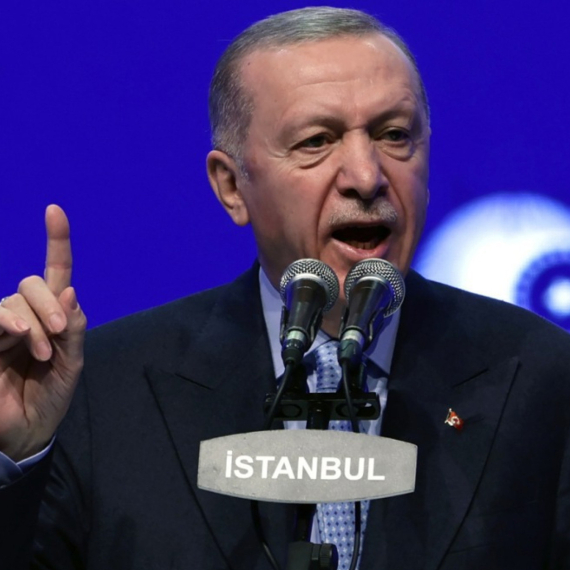"Majority in EU" for speeding up Serbia bid
A majority of EU foreign ministers support speeding up the process of Serbia’s European integration, Slovenian FM Samuel Žbogar.
Tuesday, 27.07.2010.
11:33

A majority of EU foreign ministers support speeding up the process of Serbia’s European integration, Slovenian FM Samuel Zbogar. However, he said that at least two-thirds of EU ministers state that the process still needs to be taken step by step. "Majority in EU" for speeding up Serbia bid Zbogar spoke in Brussels on Monday to say that a majority believes that "in the wake of the International Court of Justice’s Kosovo decision, efforts should be made to get Serbia’s candidacy request to the European Commission as quickly as possible in order to encourage dialogue between Belgrade and Pristina". The European Commission needs to give its opinion on whether it believes Serbia is “ready” to become a candidate for EU membership. Italian Foreign Minister Franco Frattini said that there was no conclusion adopted regarding the issue of Serbia’s EU integration, because it was not formally on the agenda. He said that after the ICJ’s opinion, "most EU countries and some countries of the world", believe that all issues but Kosovo’s status are still up for discussion between Belgrade and Pristina, namely technical questions and issues of cooperation. Frattini said that Serbian President Boris Tadic’s envoy delivered to the EU ministers Serbia’s stance on solving the Kosovo problem after the ICJ decision, adding that this position was conciliatory and opened room for dialogue between Belgrade and the Kosovo Albanians. However, EU Foreign and Security Policies Chief Catherine Ashton said that Serbia’s EU integration was not discussed, and that Kosovo was mentioned only in the context of the recent ICJ advisory opinion. The ICJ last week said that international law does not have an active provision that limits independence declarations, and that the Kosovo Albanian UDI was therefore not in breach of international law. The top UN court did not discuss the right to self-determination or secession. “The opinion of the ICJ is very clear. I said at the meeting that the future of Serbia and Kosovo is within the EU,” Ashton said. She said that the EU is ready to help the dialog between Belgrade and Pristina. Asked how Serbia’s integration could be sped up, Ashton said that there was discussion of the ICJ’s Kosovo opinion, but that “there was no discussion of the speed of European integrations, nor anything related to that”. Greek Deputy Foreign Minister Dimitris Droutsas, whose country is one of the five EU member-states that do not recognize Kosovo, said in Brussels on Monday said that Greece was willing to work in order to find a solution satisfactory to both sides. Droutsas also said that all of the EU member-states that did not recognize Kosovo initially would remain on this position, despite the ICJ’s decision.
"Majority in EU" for speeding up Serbia bid
Žbogar spoke in Brussels on Monday to say that a majority believes that "in the wake of the International Court of Justice’s Kosovo decision, efforts should be made to get Serbia’s candidacy request to the European Commission as quickly as possible in order to encourage dialogue between Belgrade and Priština".The European Commission needs to give its opinion on whether it believes Serbia is “ready” to become a candidate for EU membership.
Italian Foreign Minister Franco Frattini said that there was no conclusion adopted regarding the issue of Serbia’s EU integration, because it was not formally on the agenda.
He said that after the ICJ’s opinion, "most EU countries and some countries of the world", believe that all issues but Kosovo’s status are still up for discussion between Belgrade and Priština, namely technical questions and issues of cooperation.
Frattini said that Serbian President Boris Tadić’s envoy delivered to the EU ministers Serbia’s stance on solving the Kosovo problem after the ICJ decision, adding that this position was conciliatory and opened room for dialogue between Belgrade and the Kosovo Albanians.
However, EU Foreign and Security Policies Chief Catherine Ashton said that Serbia’s EU integration was not discussed, and that Kosovo was mentioned only in the context of the recent ICJ advisory opinion.
The ICJ last week said that international law does not have an active provision that limits independence declarations, and that the Kosovo Albanian UDI was therefore not in breach of international law. The top UN court did not discuss the right to self-determination or secession.
“The opinion of the ICJ is very clear. I said at the meeting that the future of Serbia and Kosovo is within the EU,” Ashton said.
She said that the EU is ready to help the dialog between Belgrade and Priština.
Asked how Serbia’s integration could be sped up, Ashton said that there was discussion of the ICJ’s Kosovo opinion, but that “there was no discussion of the speed of European integrations, nor anything related to that”.
Greek Deputy Foreign Minister Dimitris Droutsas, whose country is one of the five EU member-states that do not recognize Kosovo, said in Brussels on Monday said that Greece was willing to work in order to find a solution satisfactory to both sides.
Droutsas also said that all of the EU member-states that did not recognize Kosovo initially would remain on this position, despite the ICJ’s decision.


























































Komentari 7
Pogledaj komentare